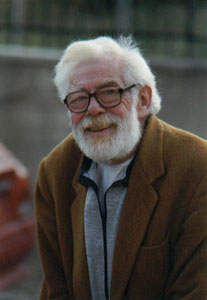
Beowulf is an Old English epic poem consisting of 3,182 alliterative lines. It is arguably one of the most important works of Old English literature. The date of composition is a matter of contention among scholars; the only certain dating pertains to the manuscript, which was produced between 975 and 1025. The author was an anonymous Anglo-Saxon poet, referred to by scholars as the "Beowulf poet".

Gaius Valerius Catullus was a Latin poet of the late Roman Republic who wrote chiefly in the neoteric style of poetry, which is about personal life rather than classical heroes. His surviving works are still read widely and continue to influence poetry and other forms of art.
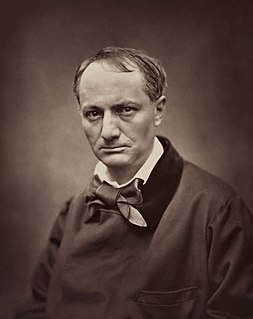
Charles Pierre Baudelaire was a French poet who also produced notable work as an essayist, art critic, and pioneering translator of Edgar Allan Poe.

An epic poem, epic, epos, or epopee is a lengthy narrative poem, ordinarily involving a time beyond living memory in which occurred the extraordinary doings of the extraordinary men and women who, in dealings with the gods or other superhuman forces, gave shape to the moral universe that their descendants, the poet and his audience, must understand to understand themselves as a people or nation.

Edward Estlin "E. E." Cummings, often styled as e e cummings, as he is attributed in many of his published works, was an American poet, painter, essayist, author, and playwright. He wrote approximately 2,900 poems, two autobiographical novels, four plays, and several essays.

Homer is the legendary author of the Iliad and the Odyssey, two epic poems that are the central works of ancient Greek literature. The Iliad is set during the Trojan War, the ten-year siege of the city of Troy by a coalition of Greek kingdoms. It focuses on a quarrel between King Agamemnon and the warrior Achilles lasting a few weeks during the last year of the war. The Odyssey focuses on the journey home of Odysseus, king of Ithaca, around 20 years after the fall of Troy. Many accounts of Homer's life circulated in classical antiquity, the most widespread being that he was a blind bard from Ionia, a region of central coastal Anatolia in present-day Turkey. Modern scholars consider these accounts legendary.

"Jabberwocky" is a nonsense poem written by Lewis Carroll about the killing of a creature named "the Jabberwock". It was included in his 1871 novel Through the Looking-Glass, and What Alice Found There, the sequel to Alice's Adventures in Wonderland. The book tells of Alice's adventures within the back-to-front world of Looking-Glass Land.

"Ozymandias" is the title of two poems published in 1818.

Poetry is a form of literature that uses aesthetic and rhythmic qualities of language—such as phonaesthetics, sound symbolism, and metre—to evoke meanings in addition to, or in place of, the prosaic ostensible meaning.
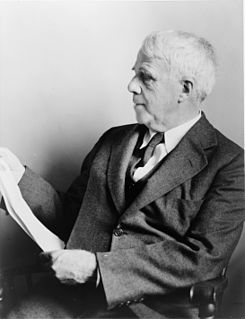
Robert Lee Frost was an American poet. His work was initially published in England before it was published in America. Known for his realistic depictions of rural life and his command of American colloquial speech, Frost frequently wrote about settings from rural life in New England in the early twentieth century, using them to examine complex social and philosophical themes.

Sylvia Plath was an American poet, novelist, and short-story writer. Born in Boston, Massachusetts, she studied at Smith College and Newnham College at the University of Cambridge before receiving acclaim as a poet and writer. She married fellow poet Ted Hughes in 1956, and they lived together in the United States and then in England. They had two children, Frieda and Nicholas, before separating in 1962.
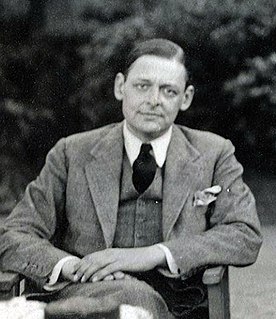
Thomas Stearns Eliot,, "one of the twentieth century's major poets" was also an essayist, publisher, playwright, and literary and social critic. Born in St. Louis, Missouri, in the United States, to a prominent Boston Brahmin family, he moved to England in 1914 at the age of 25, settling, working, and marrying there. He became a British subject in 1927 at the age of 39, renouncing his American passport.

Wystan Hugh Auden was an English-American poet. Auden's poetry was noted for its stylistic and technical achievement, its engagement with politics, morals, love, and religion, and its variety in tone, form and content. He is best known for love poems such as "Funeral Blues", poems on political and social themes such as "September 1, 1939" and "The Shield of Achilles", poems on cultural and psychological themes such as The Age of Anxiety, and poems on religious themes such as "For the Time Being" and "Horae Canonicae".

William Wordsworth was a major English Romantic poet who, with Samuel Taylor Coleridge, helped to launch the Romantic Age in English literature with their joint publication Lyrical Ballads (1798).

Publius Ovidius Naso, known as Ovid in the English-speaking world, was a Roman poet who lived during the reign of Augustus. He was a contemporary of the older Virgil and Horace, with whom he is often ranked as one of the three canonical poets of Latin literature. The Imperial scholar Quintilian considered him the last of the Latin love elegists. He enjoyed enormous popularity, but, in one of the mysteries of literary history, was sent by Augustus into exile in a remote province on the Black Sea, where he remained until his death. Ovid himself attributes his exile to carmen et error, "a poem and a mistake", but his discretion in discussing the causes has resulted in much speculation among scholars.

Phillis Wheatley, also spelled Phyllis and Wheatly was the first published African-American female poet. Born in West Africa, she was sold into slavery at the age of seven or eight and transported to North America. She was purchased by the Wheatley family of Boston, who taught her to read and write and encouraged her poetry when they saw her talent.

Poetic Edda is the modern attribution for an unnamed collection of Old Norse anonymous poems, which is different from the Edda written by Snorri Sturluson. Several versions exist, all primarily of text from the Icelandic medieval manuscript known as the Codex Regius. The Codex Regius is arguably the most important extant source on Norse mythology and Germanic heroic legends, and from the early 19th century onwards, it has had a powerful influence on later Scandinavian literatures, not only by its stories but also by the visionary force and the dramatic quality of many of the poems. It has also become an inspiring model for many later innovations in poetic meter, particularly in Nordic languages, offering many varied examples of terse, stress-based metrical schemes that lack any final rhyme by instead using alliterative devices and strongly-concentrated imagery. Poets who have acknowledged their debt to the Codex Regius include Vilhelm Ekelund, August Strindberg, J. R. R. Tolkien, Ezra Pound, Jorge Luis Borges, and Karin Boye.
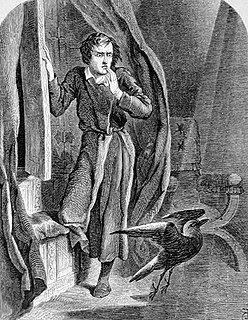
"The Raven" is a narrative poem by American writer Edgar Allan Poe. First published in January 1845, the poem is often noted for its musicality, stylized language, and supernatural atmosphere. It tells of a talking raven's mysterious visit to a distraught lover, tracing the man's slow fall into madness. The lover, often identified as being a student, is lamenting the loss of his love, Lenore. Sitting on a bust of Pallas, the raven seems to further distress the protagonist with its constant repetition of the word "Nevermore". The poem makes use of folk, mythological, religious, and classical references.

Emily Elizabeth Dickinson was an American poet.

The Waste Land is a long poem by T. S. Eliot, widely regarded as one of the most important poems of the 20th century and a central work of modernist poetry. Published in 1922, the 434-line poem first appeared in the United Kingdom in the October issue of Eliot's The Criterion and in the United States in the November issue of The Dial. It was published in book form in December 1922. Among its famous phrases are "April is the cruellest month", "I will show you fear in a handful of dust", and the mantra in the Sanskrit language "Shantih shantih shantih".

